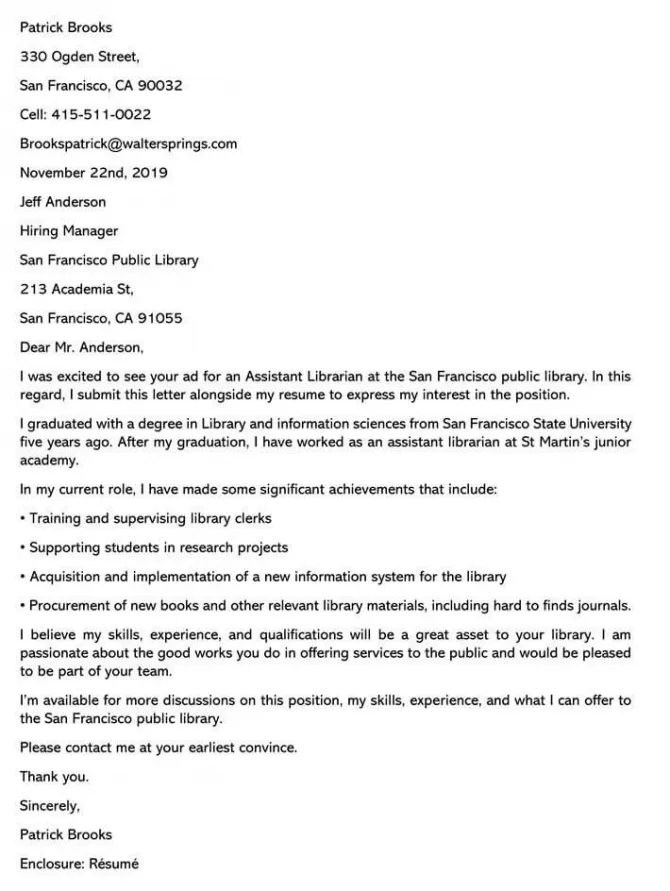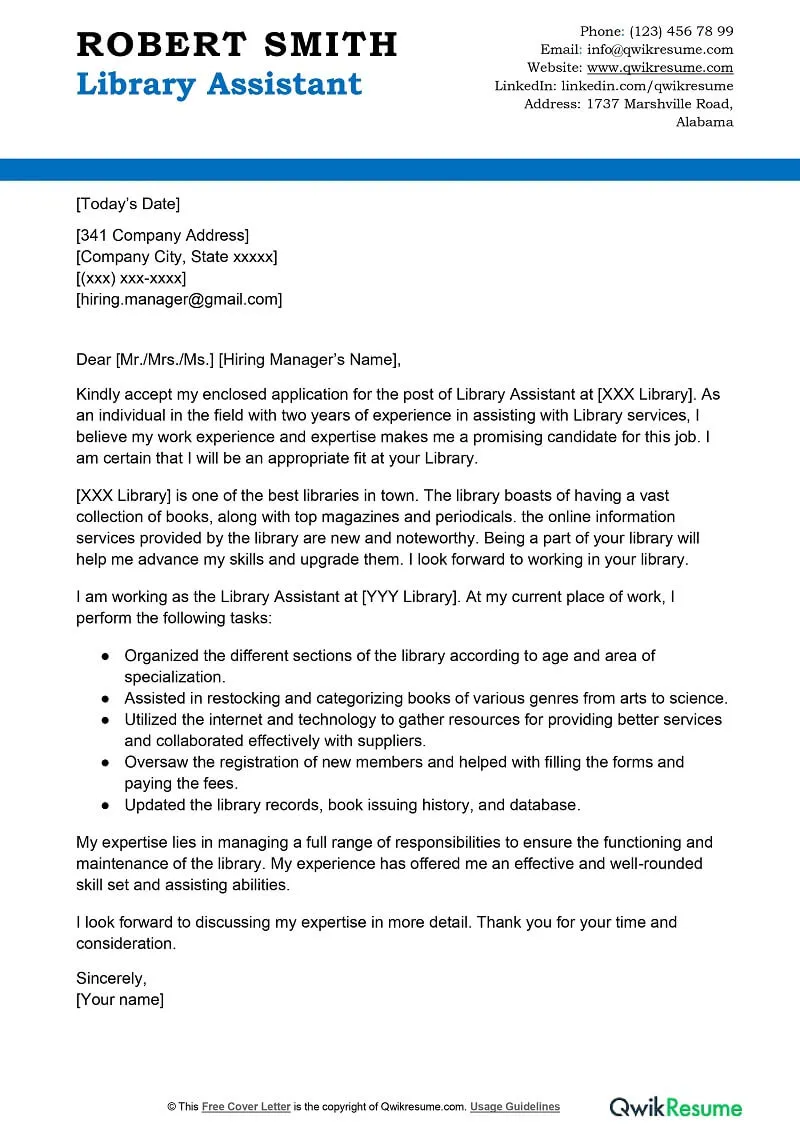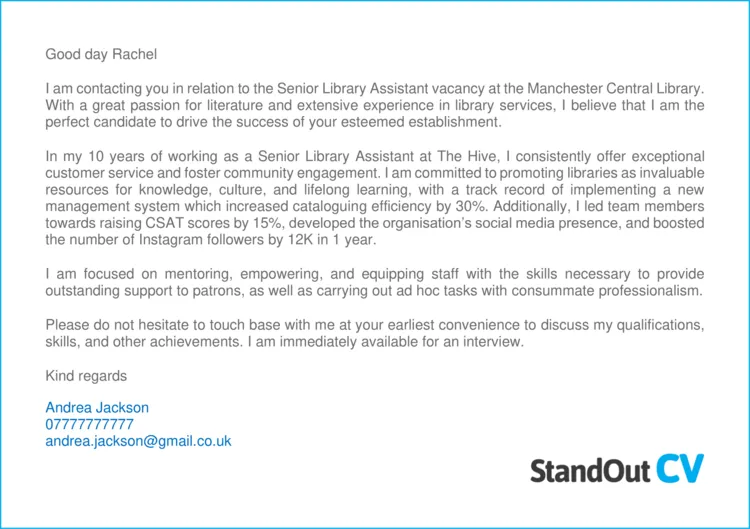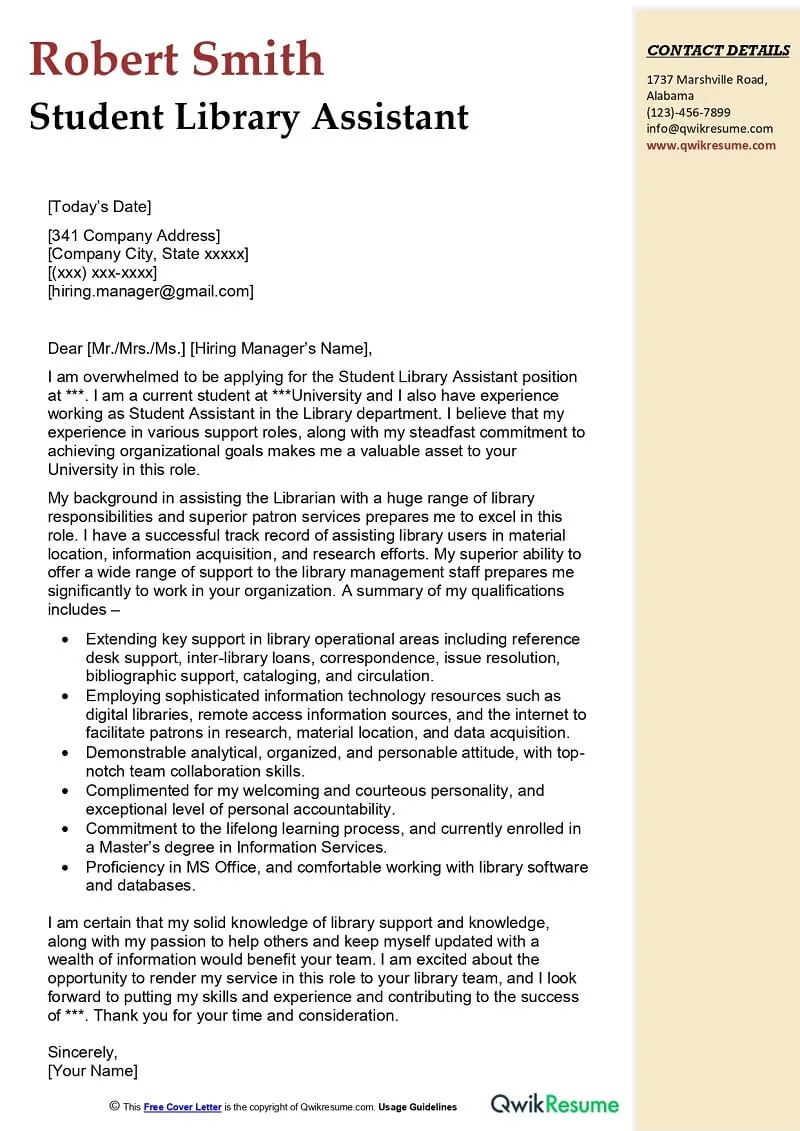Highlighting Your Skills for a Library Assistant Role
A well-crafted cover letter is your first impression on a potential employer, and for a Library Assistant role, it’s crucial to highlight the skills that make you a strong candidate. This isn’t just about listing your previous jobs; it’s about demonstrating how your abilities align with the specific requirements of the position and the values of the library. Your cover letter should be a concise and compelling narrative that showcases your suitability for the role, encouraging the hiring manager to delve deeper into your resume and consider you for an interview. Focus on the skills and experiences that are most relevant, and remember to tailor your letter to each specific job application to make it stand out from the crowd.
Relevant Skills to Showcase
The role of a Library Assistant is multifaceted, requiring a diverse skill set. Your cover letter should explicitly mention and elaborate on your proficiency in areas most valued by libraries. This section should detail your competency in areas like communication, organization, and technical abilities. Providing specific examples of how you have utilized these skills in previous roles or situations will significantly strengthen your application. This proactive approach demonstrates your understanding of the role and your readiness to contribute to the library’s operations from day one. Tailor your skills to those mentioned in the job description to improve your chances.
Communication and Interpersonal Abilities

Libraries are community hubs, and Library Assistants are the face of the institution. Effective communication is therefore a paramount skill. Mention your ability to interact with patrons from all backgrounds, your active listening skills, and your capacity to explain library policies and services clearly. Provide examples of how you have resolved patron inquiries or handled difficult situations with courtesy and professionalism. Highlighting your ability to work collaboratively with colleagues is equally important, demonstrating your teamwork capabilities.
Organizational and Time Management Skills
Library environments are often fast-paced and require efficient management. Showcasing your organizational abilities is critical. Detail your experience with shelving, inventory management, or maintaining library materials. Provide examples of how you’ve managed multiple tasks simultaneously, met deadlines, and prioritized work efficiently. Highlight any experience you have in organizing events, managing schedules, or coordinating resources, as this demonstrates your capacity to contribute to the smooth running of the library.
Technical Proficiency
In today’s digital age, technical skills are invaluable. Outline your proficiency with library software, such as integrated library systems (ILS), and your comfort with computers, databases, and other digital resources. If you have experience with online cataloging, digital archiving, or assisting patrons with technology, be sure to mention it. Demonstrate your adaptability to new technologies and your willingness to learn, as libraries are constantly evolving with the integration of new technological solutions.
Formatting Your Cover Letter Effectively

The appearance of your cover letter can significantly impact the first impression you make on the hiring manager. Professional formatting conveys attention to detail and respect for the application process. Your cover letter should be easy to read, well-organized, and free of errors. A polished cover letter suggests that you are a meticulous individual who pays attention to details, important traits for a Library Assistant. Choosing the correct layout and formatting style can make your skills and experiences stand out more.
Header and Contact Information
Start with a clear and professional header that includes your name, address, phone number, and email address. This information should be prominently displayed at the top of your letter. Also, include the date and the hiring manager’s name and title (if available), along with the library’s address. Ensure all contact information is accurate and up-to-date. Double-check for typos or errors, as these small details can undermine your credibility.
Professional Salutation and Introduction
Begin your letter with a formal salutation, such as ‘Dear Mr./Ms./Mx. [Last Name]’ or ‘Dear Hiring Manager’ if you don’t know the specific name. Your introduction should be concise and immediately state the position you are applying for and where you saw the job posting. Briefly mention why you are interested in the role and the library. This opening paragraph should capture the reader’s attention and set the tone for the rest of the letter, establishing your enthusiasm.
Body Paragraphs Highlighting Key Skills

The body paragraphs are where you demonstrate your skills and experiences. Each paragraph should focus on a specific skill or achievement relevant to the job description. Use the STAR method (Situation, Task, Action, Result) to provide detailed examples of how you’ve used your skills in the past. Quantify your achievements whenever possible, such as ‘assisted an average of 50 patrons per day’. This section is your chance to convince the employer that you are the ideal candidate by providing compelling evidence of your abilities.
Tailoring Your Letter to the Job Description
Carefully review the job description and tailor your cover letter to match the specific requirements. Identify the keywords used in the job posting and incorporate them naturally into your letter. This shows that you understand the needs of the library and are a good fit. Do not merely repeat the job description; instead, use it as a guide to showcase your relevant skills and experiences in the most compelling way.
Quantifying Your Achievements
Whenever possible, quantify your achievements to make a more impactful impression. Use numbers and statistics to show the tangible results of your work. For instance, instead of saying ‘managed a large collection,’ say ‘managed a collection of over 10,000 items, ensuring 99% accuracy in cataloging’. This demonstrates the value you bring to the role and provides concrete evidence of your skills.
Writing a Compelling Conclusion

Your conclusion should summarize your interest in the position and reiterate your enthusiasm. Express your gratitude for the hiring manager’s time and consideration. Include a call to action by stating your availability for an interview and providing your contact information. This final paragraph should leave a positive and memorable impression, encouraging the employer to take the next step in the hiring process.
Expressing Enthusiasm and Availability
End your cover letter with a clear expression of your enthusiasm for the position and the library. Mention that you are eager to learn more about the opportunity and discuss how your skills and experience align with the library’s goals. State your availability for an interview, including how the hiring manager can contact you. Reiterate your interest and show your commitment to the role, highlighting your proactive approach.
Proofreading and Editing
Before submitting your cover letter, proofread it carefully for any grammatical errors, spelling mistakes, or typos. Ensure that your letter is well-written and free of any inconsistencies. Consider asking a friend or family member to review your letter for feedback. A polished and error-free cover letter demonstrates your attention to detail and professionalism. Proofreading is a vital step in presenting yourself as a qualified candidate.
